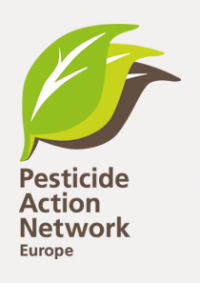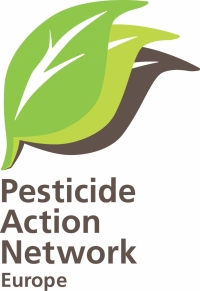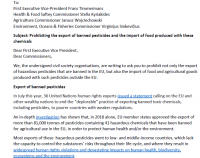Letters

Letter : European NGOs support the initiatives in Switzerland to ban pesticides
Brussels, 12 May 2021 - Letter : European NGOs support the initiatives in Switzerland to ban pesticides
Letter available in English and in German.

Open letter to Commissioner Sinkevičius : Enhancing implementation of the European Biodiversity Strategy in European towns by using EU Green Capitals and Green Leaf awards as well as the Green City Accord
Dear Commissioner Sinkevičius,
Pesticide Action Network (PAN) Europe is a Brussels based NGO working with its 45 national members to replace hazardous pesticides with sustainable, non-chemical alternatives. PAN Europe is in these first days of spring celebrating the Pesticide Action Week, aiming at raising awareness on the health and environment risks of chemical pesticides, highlighting and promoting alternative solutions, while building an international network for a pesticide-free world.

Letter to Commissioners Timmermans and Kyriakides on the Bee Guidance Document and Specific Protection Goals
Dear Commissioner Kyriakides, Dear Vice-president Timmermans,
On 13 January 2021, the European Commission held, jointly with the European Food Safety Authority (EFSA), a workshop where the EFSA exposed its methodology to fix the Specific Protection Goals (SPGs) for honey bees. We are writing to you because we have several concerns related to the scientific and technical approach that EFSA has applied and the regulatory consequences of this recent work from EFSA.
About the scientific and technical approach of the EFSA for defining SPGs:

Letter to EU Ombudsman concerning Complaints 1570/2018/JF and 1973/2018/JF, and request for comments (January 2020)

Open Letter to Executive Vice-President Frans Timmermans and Commissioners Stella Kyriakides, Janusz Wojciechowski and Virginijus Sinkevičius asking to prohibit the export of banned pesticides and the import of food produced with these chemicals
In November 2020, together with over 70 NGOs from all over the EU, PAN Europe sent a letter to the European Commission demanding it act to prohibit the export of banned pesticides and the import of food produced with these chemicals.

Open letter to Commission President Von der Leyen on the withdrawal of the Commission proposal for the post-2020 Common Agricultural Policy

Letter to EU Health & Consumer Policy Commissioner, Stella Kyriakides, concerning the phase-out of soil fumigants.

